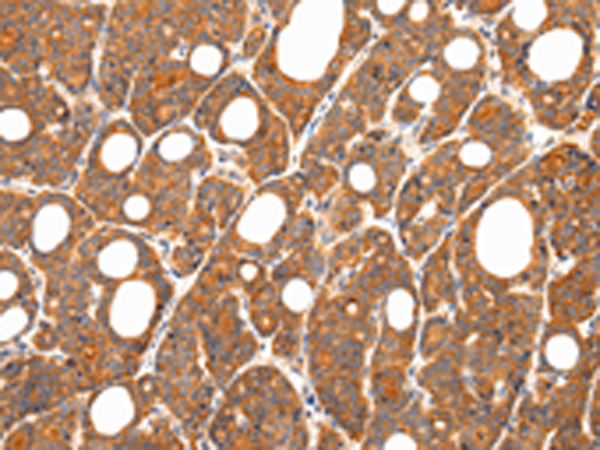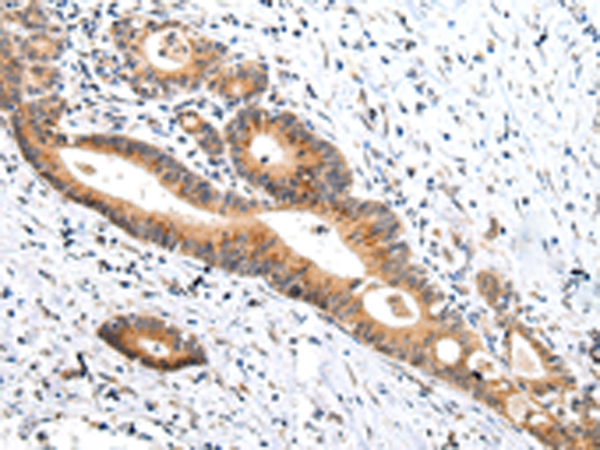

| WB | 咨询技术 | Human,Mouse,Rat |
| IF | 咨询技术 | Human,Mouse,Rat |
| IHC | 1/25-1/100 | Human,Mouse,Rat |
| ICC | 技术咨询 | Human,Mouse,Rat |
| FCM | 咨询技术 | Human,Mouse,Rat |
| Elisa | 1/2000-1/5000 | Human,Mouse,Rat |
| Aliases | ZBP-99; ZNP-99 |
| Host/Isotype | Rabbit IgG |
| Antibody Type | Primary antibody |
| Storage | Store at 4°C short term. Aliquot and store at -20°C long term. Avoid freeze/thaw cycles. |
| Species Reactivity | Human, Mouse |
| Immunogen | Synthetic peptide of human ZNF281 |
| Formulation | Purified antibody in PBS with 0.05% sodium azide and 50% glycerol. |
+ +
以下是关于ZNF281抗体的3篇参考文献示例,涵盖其在不同研究中的应用和功能分析:
---
1. **文献名称**:*ZNF281 promotes colorectal cancer progression by regulating the transcription of* **EGFR**
**作者**:Zhang Y, et al.
**摘要**:该研究通过Western blot和免疫组化(IHC)分析,发现ZNF281在结直肠癌中高表达,并利用特异性抗体验证其通过调控EGFR转录促进肿瘤侵袭的机制。
---
2. **文献名称**:*ZNF281 as a Novel Regulator of Neural Stem Cell Differentiation*
**作者**:Li H, et al.
**摘要**:研究使用ZNF281抗体进行染色质免疫沉淀(ChIP-seq)和免疫荧光染色,证明ZNF281通过结合神经分化相关基因启动子,抑制干细胞多能性并促进神经分化。
---
3. **文献名称**:*Zinc Finger Protein 281 Cooperates with p53 to Suppress Tumor Metastasis*
**作者**:Wang X, et al.
**摘要**:通过免疫共沉淀(Co-IP)和免疫荧光技术,结合ZNF281抗体,揭示了ZNF281与p53蛋白相互作用,抑制上皮-间质转化(EMT)并减少乳腺癌转移的分子机制。
---
**备注**:实际文献需通过PubMed、Google Scholar等平台以关键词“ZNF281 antibody”或“ZNF281 function”检索获取最新数据,以上为模拟示例。
ZNF281 (Zinc Finger Protein 281) is a transcription factor belonging to the Krüppel-associated box (KRAB) domain-containing zinc finger protein family. It plays a critical role in regulating gene expression by binding to specific DNA sequences via its C-terminal C2H2-type zinc finger domains. ZNF281 is involved in diverse cellular processes, including cell proliferation, differentiation, and apoptosis, and has been implicated in cancer progression, stem cell maintenance, and epithelial-mesenchymal transition (EMT). Studies highlight its interaction with key signaling pathways, such as Wnt/β-catenin and p53. where it modulates transcriptional programs influencing tumorigenesis and metastasis. In cancer contexts, ZNF281 often exhibits dual roles—acting as an oncogene or tumor suppressor depending on the tissue type—making it a focus of research in cancers like colorectal, breast, and pancreatic cancer.
Antibodies targeting ZNF281 are essential tools for investigating its expression, localization, and functional mechanisms. These antibodies enable detection via techniques such as Western blotting, immunohistochemistry (IHC), immunofluorescence (IF), and chromatin immunoprecipitation (ChIP). Commercially available ZNF281 antibodies are typically validated for specificity against conserved epitopes, often in human or murine samples. Researchers use them to explore ZNF281's role in disease models, its regulation of target genes (e.g., MYC, CDKN1A), and its potential as a biomarker or therapeutic target. Reliable antibodies are critical for elucidating ZNF281's complex contributions to cellular homeostasis and pathology.
×